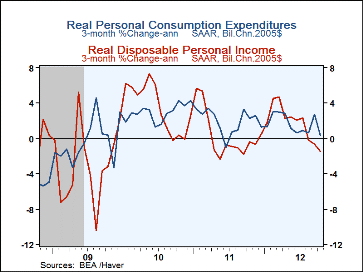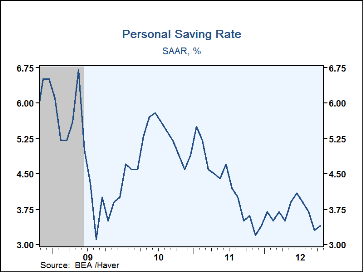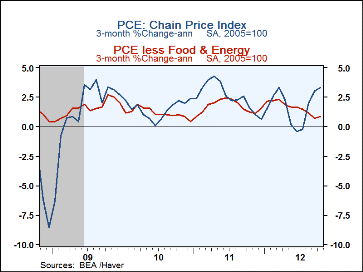 Global| Nov 30 2012
Global| Nov 30 2012U.S. Income & Outlays Are Reduced by Sandy
by:Tom Moeller
|in:Economy in Brief
Summary
Hurricane Sandy made landfall on October 29th and thus reduced three days worth of income & outlays along the Eastern Seaboard. Personal income was unchanged last month (3.1% y/y) following an unrevised 0.4% September increase. A 0.2% [...]
 Hurricane Sandy made landfall on October 29th and thus reduced three days worth of income & outlays
along the Eastern Seaboard. Personal income was unchanged last month (3.1% y/y) following an unrevised
0.4% September increase. A 0.2% gain was expected. Wages & salaries fell 0.2% (+2.5% y/y) but that decline
was offset by a 1.3% (-1.8% y/y) jump in interest income and a 0.6% (7.8% y/y) gain in dividend income. Transfer
payments fell 0.3% (+3.1% y/y). After tax income also was unchanged (3.0% y/y). In constant dollars, however,
disposable income slipped 0.1% (+1.2% y/y).
Hurricane Sandy made landfall on October 29th and thus reduced three days worth of income & outlays
along the Eastern Seaboard. Personal income was unchanged last month (3.1% y/y) following an unrevised
0.4% September increase. A 0.2% gain was expected. Wages & salaries fell 0.2% (+2.5% y/y) but that decline
was offset by a 1.3% (-1.8% y/y) jump in interest income and a 0.6% (7.8% y/y) gain in dividend income. Transfer
payments fell 0.3% (+3.1% y/y). After tax income also was unchanged (3.0% y/y). In constant dollars, however,
disposable income slipped 0.1% (+1.2% y/y).
The dollar value of personal consumption expenditures fell 0.2% (+3.1% y/y) after an unrevised 0.8% September jump. A 0.1% increase had been expected. Adjusted for price inflation, spending fell 0.3% (+1.3% y/y). Much of that decline reflected a 4.4% (3.1% y/y) decline in spending of motor vehicles reversing the September jump. Spending of home furnishings also fell 0.8% (+4.2% y/y) and reversed the earlier rise while clothing spending fell 1.2% (+1.0% y/y) but that mostly negated three months of increase. Real services spending slipped 0.1% (+1.0% y/y).
The unchanged income level set against the decline in spending raised the personal savings rate minimally to 3.4%, still nearly its lowest since November of last year.
The PCE chain price index ticked up 0.1% (1.7% y/y). The increase reflected 0.2% increases in both services (2.0% y/y) and nondurables (2.8% y/y) prices. The latter gain also reflected a 0.4% (+8.7% y/y) drop in gasoline prices. Durable goods prices fell another 0.2% (-1.8% y/y). Less food and energy, the PCE chain price index again ticked up 0.1% (1.6% y/y).
The personal income & consumption figures are available in Haver's USECON and USNA databases. The consensus expectations figures are in the AS1REPNA database.
| Personal Income & Outlays (%) | Oct | Sep | Aug | Y/Y | 2011 | 2010 | 2009 |
|---|---|---|---|---|---|---|---|
| Personal Income | 0.0 | 0.4 | 0.1 | 3.1 | 5.1 | 3.8 | -4.8 |
| Wages & Salaries | -0.2 | 0.3 | 0.0 | 2.5 | 4.0 | 2.1 | -4.3 |
| Disposable Personal Income | 0.0 | 0.4 | 0.1 | 3.0 | 3.8 | 3.8 | -2.7 |
| Personal Consumption Expenditures | -0.2 | 0.8 | 0.3 | 3.1 | 5.0 | 3.8 | -1.9 |
| Personal Saving Rate | 3.4 | 3.3 | 3.7 | 3.6 (Oct'11) |
14.2 | 5.1 | 4.7 |
| PCE Chain Price Index | 0.1 | 0.3 | 0.4 | 1.7 | 2.4 | 1.9 | 0.1 |
| Less Food & Energy | 0.1 | 0.1 | 0.0 | 1.6 | 1.4 | 1.5 | 1.4 |
| Real Disposable Income | -0.1 | 0.0 | -0.3 | 1.2 | 1.3 | 1.8 | -2.8 |
| Real Personal Consumption Expenditures |
-0.3 | 0.4 | -0.0 | 1.3 | 2.5 | 1.8 | -1.9 |
Tom Moeller
AuthorMore in Author Profile »Prior to joining Haver Analytics in 2000, Mr. Moeller worked as the Economist at Chancellor Capital Management from 1985 to 1999. There, he developed comprehensive economic forecasts and interpreted economic data for equity and fixed income portfolio managers. Also at Chancellor, Mr. Moeller worked as an equity analyst and was responsible for researching and rating companies in the economically sensitive automobile and housing industries for investment in Chancellor’s equity portfolio. Prior to joining Chancellor, Mr. Moeller was an Economist at Citibank from 1979 to 1984. He also analyzed pricing behavior in the metals industry for the Council on Wage and Price Stability in Washington, D.C. In 1999, Mr. Moeller received the award for most accurate forecast from the Forecasters' Club of New York. From 1990 to 1992 he was President of the New York Association for Business Economists. Mr. Moeller earned an M.B.A. in Finance from Fordham University, where he graduated in 1987. He holds a Bachelor of Arts in Economics from George Washington University.
More Economy in Brief
 Global| Feb 05 2026
Global| Feb 05 2026Charts of the Week: Balanced Policy, Resilient Data and AI Narratives
by:Andrew Cates








